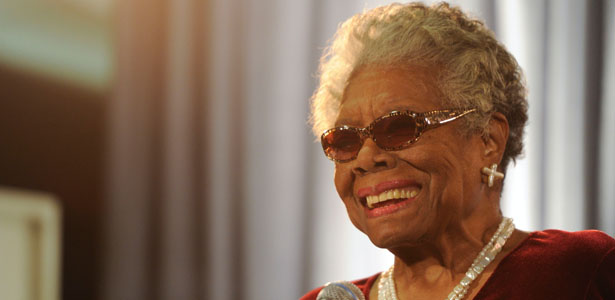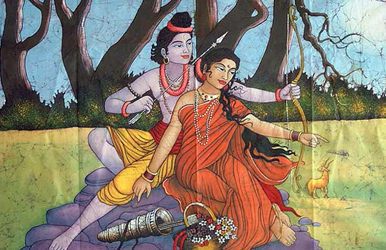What Maya Angelou Means When She Says 'Shakespeare Must Be a Black Girl'
"The poetry you read has been written for you, each of you—black, white, Hispanic, man, woman, gay, straight."

"Shakespeare must be a black girl."
Theories about the true identity of the author known as Shakespeare abound. Among those said by skeptics who might actually be the bard are contemporary playwright Christopher Marlowe; Sir Francis Bacon; the Earl of Oxford; a gay man; or perhaps rather than a single author, a collective including actors and various writers. Dozens more alternative theories have been proffered as alternatives to the traditional attribution of a copious body of work that includes some of the best loved sonnets and dramas in the English language to the man from Stratford-upon-Avon. But a black girl?
That was exactly the suggestion Maya Angelou made during an electrifying lecture held this week at Randolph College in Lynchburg, Virginia. Angelou, a great poet, novelist, and artist in her own right, was speaking metaphorically, of course.
Eighty-four years old and seated on the stage in a wheelchair for most of the address—looking more dignified than most able-bodied folks half her age--Angelou explained how as a young girl who once read (with no claim, necessarily, to understanding) every book in the tiny library in Stamps, Arkansas, she thought that the author of Sonnet 29 must have been a black girl because its solemn words expressed so fiercely what she—an outcast, the victim of racism, destitution, and childhood sexual abuse, crying out alone before a deaf heaven—felt inside:
When in disgrace with Fortune and men's eyes,
I all alone beweep my outcast state,
And trouble deaf heaven with my bootless cries,
And look upon myself and curse my fate,
Wishing me like to one more rich in hope,
Featured like him, like him with friends possess'd,
Desiring this man's art, and that man's scope,
With what I most enjoy contented least.
Yet in these thoughts myself almost despising,
Haply I think on thee, and then my state,
Like to the lark at break of day arising
From sullen earth, sings hymns at heaven's gate;
For thy sweet love remember'd such wealth brings
That then I scorn to change my state with kings.
And when Angelou recited them to us, these words sounded indeed like they had sprung forth from her soul.
Of course, what is best known about Angelou, besides her own words, is her silence. As a result of the abuse she experienced as a child, she was mute from the age of 7 to 13, an experience she writes about in her autobiography, I Know Why the Caged Bird Sings. But she has been anything but silent since then.
In the women's literature class I'm teaching this semester—in which we are reading Angelou, along with Julian of Norwich, Margery Kempe, Anne Bradstreet, Phyllis Wheatley, Charlotte Bronte, Sylvia Plath, Margaret Atwood, and many more female authors—we are emphasizing the distinctive qualities of women's literature. We are marking what these authors bring to bear on the human condition, the tensions their writing reveals between public and private, personal and political, and the ways in which women's writing speaks to experiences at variance with those of the male writers in the traditional canon.
But Angelou's message was that there is more in poetry—and, by extension, all art—that unites than divides us. Not only can a long-dead, uber-white male writer like Shakespeare voice an experience so universal that it speaks truth to power for a poor black girl living in the Jim Crow American South, but that same girl can reflect years later on how the poetry of her beloved Edgar Allen Poe reads "like it was written by LL Cool J." (And that same girl can get kicked out of a theater for heckling a famous actor when he reads "The Raven" more like a Shakespearean actor than a rapper.)
Angelou's lecture, like the body of her work, was a testament to the power of art to unite us. It was also a testament to the power of art to save us. That was the theme of Angelou's talk: "Poetry has kept us alive," she declared again and again.
By "us," she sometimes meant her own people, those who were and descended from enslaved Americans who have survived in this country for 400 years. Because of poetry, "We are still here," she said.
But by "us" she mostly meant all of us. "The poetry you read has been written for you, each of you—black, white, Hispanic, man, woman, gay, straight." It has been written—and must be read, "so that you know you've already been paid for," she proclaimed like a preacher from the pulpit. She closed her lecture by reading the poem she was invited to write upon the occasion of the 50th anniversary for the United Nations. Then she said, "I wrote it for you."
Just like a dead white man once wrote a sonnet for her.
